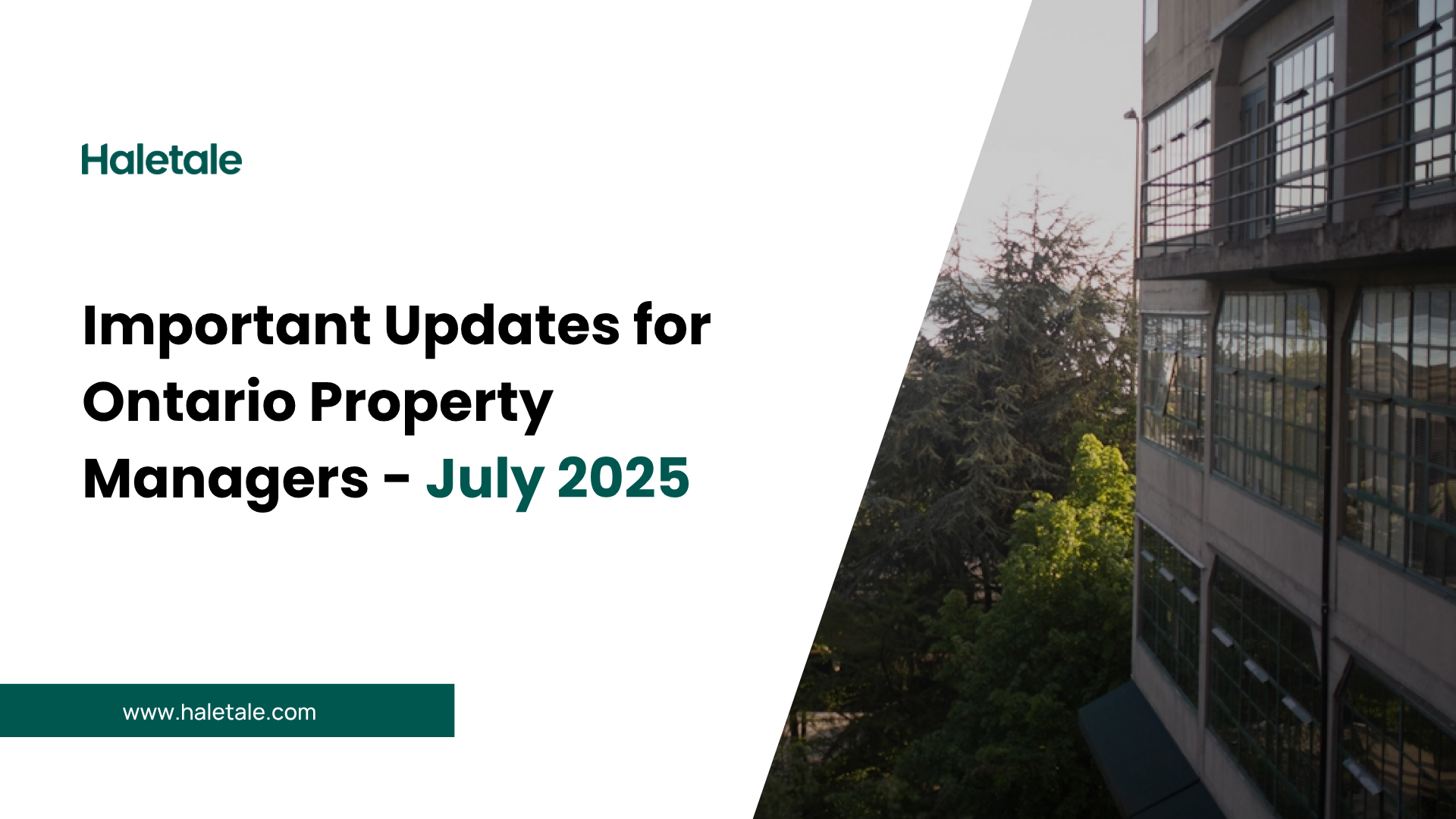Important Updates Ontario Property Managers Should Know About in July 2025
Last Updated: July 17, 2025
TL;DR – Quick Summary for Busy Property Managers
???? URGENT ACTION REQUIRED:
- Rent Increases: 2.5% maximum for 2025 – update your lease workflows now
- Toronto Renovictions: New licensing required as of July 31, 2025 – fines up to $100,000
- Energy Reporting: July 1-2 deadlines for large properties – submit now to avoid penalties
- Lease Audit: Competition Bureau warning on anticompetitive clauses – review agreements immediately
- Market Opportunity: 3-bedroom shared units up 1.5% – consider group housing strategies
???? Critical Deadlines This Month:
- July 31: Toronto renoviction licensing takes effect
- Ongoing: Energy/water reporting compliance checks
As we navigate through the summer of 2025, Ontario property managers face a rapidly evolving regulatory landscape that demands immediate attention and strategic planning. From new rent increase guidelines to Toronto’s renoviction licensing requirements, staying informed isn’t just about compliance—it’s about protecting your bottom line and maintaining positive tenant relationships.
Whether you’re managing a single rental property or overseeing a large portfolio, these five critical updates will directly impact your operations, legal obligations, and profitability in the coming months.
1. Ontario’s 2025 Rent Increase Guideline: What 2.5% Means for Your Portfolio
The Ontario government has officially set the 2025 rent increase guideline at 2.5%, maintaining the same rate as previous years. This figure represents the maximum allowable increase for most residential rental units covered by the Residential Tenancies Act (RTA). (See Source)
Key Implementation Details:
- Effective Date: The 2.5% guideline applies to rent increases taking effect between January 1, 2025, and December 31, 2025
- Coverage: Applies to most residential rental units, with exceptions for units first occupied after November 15, 2018
- Notice Requirements: Landlords must provide 90 days’ written notice using the official N1 form
Strategic Action Steps:
Review your lease renewal workflows immediately if you haven’t already adjusted for the 2.5% increase. Many property managers are finding success by automating their tenant communication systems to ensure compliance while reducing administrative burden.
Pro Tip: Implement automated reminder systems for lease renewals and rent increase notices. This not only ensures compliance but can save property managers up to 10 hours per month on administrative tasks.
2. Toronto’s Game-Changing Renoviction Licensing: Effective July 31, 2025
Toronto has introduced a significant new requirement that fundamentally changes how landlords approach renovation evictions. As of July 31, 2025, any landlord issuing an N13 renovation eviction notice must first obtain a Rental Renovation Licence from the city.
Critical Requirements Include:
- Permit Verification: All necessary building permits must be secured before applying
- Professional Authorization: Qualified professionals must verify renovation plans
- Tenant Notification: Formal notice to tenants with clear explanation of their rights
- Return Rights: Tenants must be offered the right to return after renovations
- Financial Obligations: If tenants choose not to return, landlords must pay three months’ rent compensation
Financial Impact and Penalties:
Non-compliance isn’t just a paperwork issue—it carries serious financial consequences. The city can impose fines up to $100,000 for violations, making this one of the most expensive compliance failures a property manager can face. (See Source)
Implementation Strategy:
Property managers should immediately audit their current eviction and renovation processes. Create a comprehensive checklist that includes permit applications, professional consultations, tenant communication templates, and financial planning for potential compensation payments.
Action Item: Establish relationships with licensed contractors and legal professionals who understand the new requirements. Having these partnerships in place before you need them can prevent costly delays and compliance issues.
3. Energy and Water Reporting Deadlines: July 1-2 Compliance Requirements
Large property owners in Ontario face immediate reporting deadlines that many managers overlook until it’s too late. The dual reporting requirements under Ontario Regulation 506/18 and Toronto’s Energy & Water Reporting By-law (EWRB) create a tight compliance window. (See source)
Reporting Schedule:
- July 1, 2025: Submit 2024 utility data to the Ontario Ministry of Energy
- July 2, 2025: Submit reports to the City of Toronto (buildings ≥50,000 square feet)
Additional Requirements for Large Properties:
Properties over 100,000 square feet must also secure professional data verification, adding another layer of complexity and cost to the reporting process.
Compliance Strategy:
If you haven’t already requested utility reports from your suppliers, do so immediately. Many utilities require 2-3 weeks to process these requests, and missing the deadline can result in penalties and regulatory scrutiny.
Technology Solution: Consider implementing Portfolio Manager software to streamline data collection and verification. Many property managers report that automated systems reduce reporting time by 75% while improving accuracy.
4. Competition Bureau Warning: Avoiding Anticompetitive Lease Practices
The Competition Bureau of Canada issued a significant warning on June 4, 2025, specifically targeting anticompetitive practices in rental markets. This warning should prompt immediate action from property managers to review their lease agreements and business practices. (see source)
Prohibited Practices Include:
- Exclusivity Clauses: Restrictions that prevent tenants from accessing competing services
- Restrictive Covenants: Unreasonable limitations on tenant activities or choices
- Informal Collusion: Coordinated pricing discussions between landlords or property managers
Risk Assessment:
In late June 2025, the Competition Bureau flagged informal landlord collusion on rent pricing as a particular concern. This includes seemingly innocent discussions about market rates that could be interpreted as price-fixing.
Immediate Action Required:
Conduct a comprehensive audit of your lease templates, management practices, and any informal communications with other property managers or landlords. Remove any clauses that could be interpreted as anticompetitive and establish clear guidelines for market rate discussions.
Legal Protection: Consider having your lease agreements reviewed by a lawyer specializing in competition law. The cost of legal review is minimal compared to the potential penalties for violations.
5. July 2025 Rental Market Trends: Opportunities in Flat Market Conditions
Understanding current market conditions helps property managers make strategic decisions about pricing, marketing, and property improvements. Ontario’s rental market in July 2025 presents both challenges and opportunities. (See source)
Current Market Dynamics:
- Overall Trend: Flat rental rates across most property types
- Supply Increase: New rental supply entering the market
- Exception: 3-bedroom shared units showing approximately 1.5% growth in May 2025
Strategic Opportunities:
The flat market doesn’t mean stagnation—it means strategic property managers can gain competitive advantages through targeted approaches. The growth in 3-bedroom shared housing suggests demand for alternative rental arrangements.
Revenue Optimization Strategies:
Consider promoting group housing arrangements or shared accommodation where market demand exists. This trend toward shared living can unlock new revenue streams while meeting evolving tenant preferences.
Market Positioning: Properties that offer flexible shared arrangements or group-friendly amenities may command premium rates even in a flat market environment.
Staying Ahead: Technology and Process Automation
Successful property management in Ontario’s evolving regulatory environment increasingly depends on efficient systems and processes. Property managers who invest in automation and technology solutions consistently outperform those relying on manual processes.
Recommended Technology Investments:
- Automated Compliance Systems: Track deadlines, generate required notices, and maintain documentation
- Tenant Communication Platforms: Streamline lease renewals, rent increases, and regulatory notifications
- Financial Management Tools: Monitor cash flow impacts of new regulations and market conditions
- Document Management Systems: Ensure easy access to permits, licenses, and compliance records
Conclusion: Proactive Management in a Complex Environment
The regulatory landscape for Ontario property managers continues to evolve rapidly, with significant changes taking effect throughout 2025. Success depends on staying informed, implementing efficient processes, and maintaining strict compliance with all requirements.
Property managers who proactively address these updates—from rent increase guidelines to renoviction licensing—position themselves for continued success while avoiding costly penalties and legal complications.
The key to thriving in this environment is treating compliance not as a burden, but as a competitive advantage. Properties with streamlined processes, clear communication, and efficient systems attract better tenants and command higher rents, even in flat market conditions.
Take Action Today: Review your current processes against these five critical updates. Identify gaps in your compliance systems and implement solutions before they become urgent problems. Your future self—and your bottom line—will thank you for the proactive approach.
Need help implementing these changes in your property management operations? Consider consulting with legal and technology professionals who specialize in Ontario rental regulations. Staying compliant isn’t just about following rules—it’s about building a sustainable, profitable property management business.









